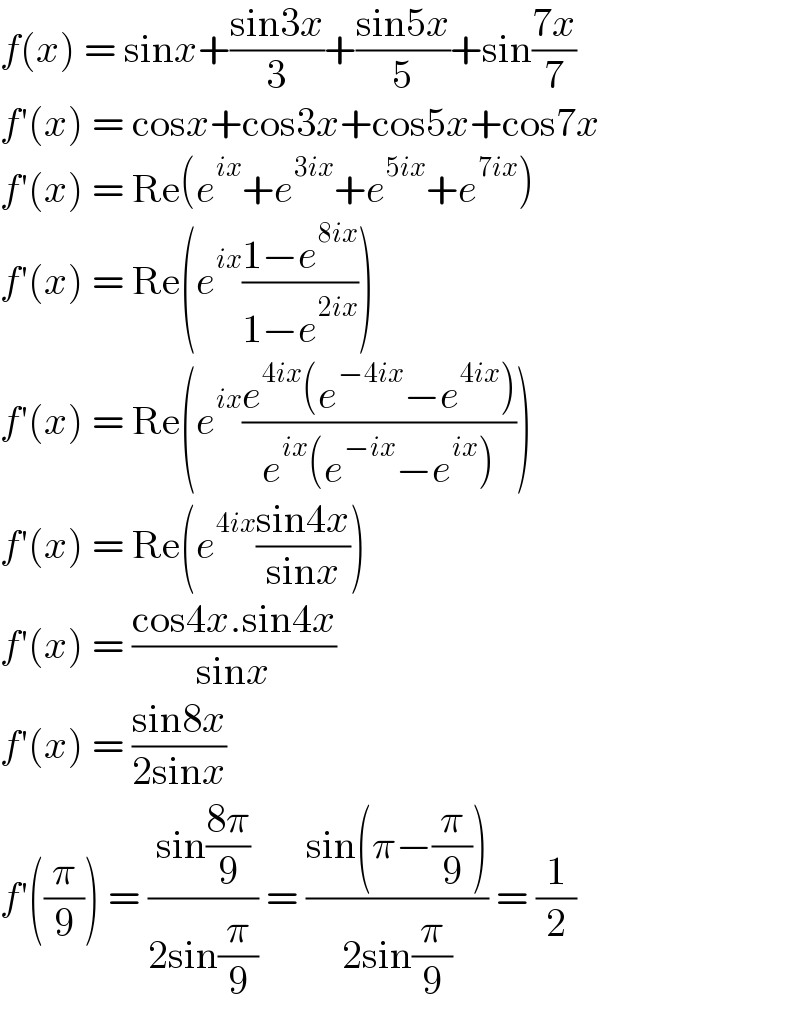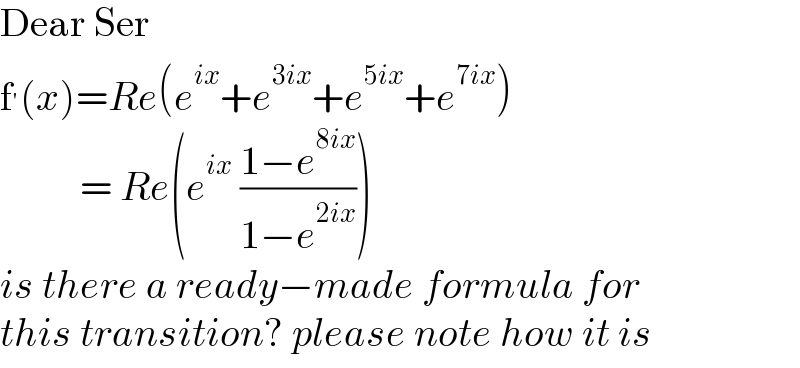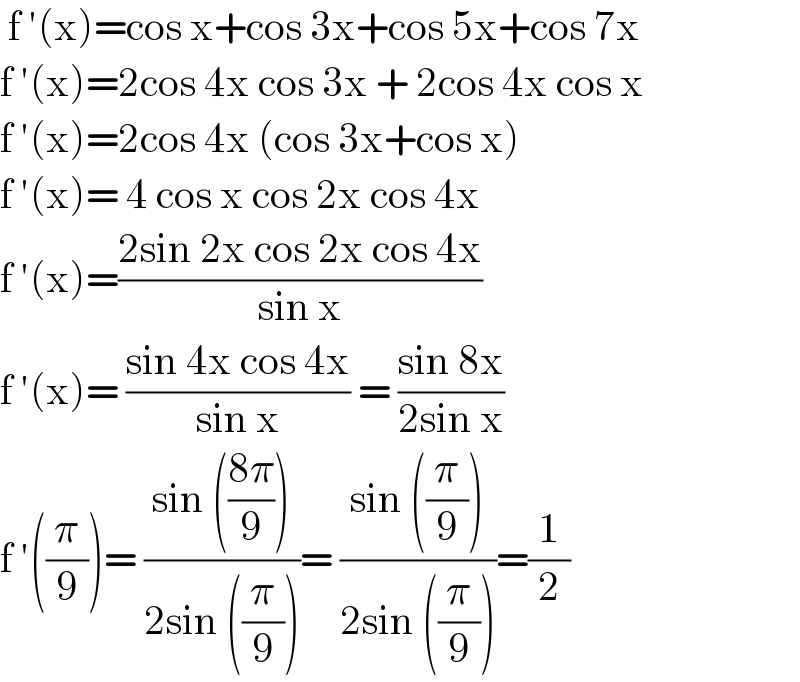Question Number 151858 by mathdanisur last updated on 23/Aug/21

Answered by Olaf_Thorendsen last updated on 23/Aug/21

$${f}\left({x}\right)\:=\:\mathrm{sin}{x}+\frac{\mathrm{sin3}{x}}{\mathrm{3}}+\frac{\mathrm{sin5}{x}}{\mathrm{5}}+\mathrm{sin}\frac{\mathrm{7}{x}}{\mathrm{7}} \\ $$$${f}'\left({x}\right)\:=\:\mathrm{cos}{x}+\mathrm{cos3}{x}+\mathrm{cos5}{x}+\mathrm{cos7}{x} \\ $$$${f}'\left({x}\right)\:=\:\mathrm{Re}\left({e}^{{ix}} +{e}^{\mathrm{3}{ix}} +{e}^{\mathrm{5}{ix}} +{e}^{\mathrm{7}{ix}} \right) \\ $$$${f}'\left({x}\right)\:=\:\mathrm{Re}\left({e}^{{ix}} \frac{\mathrm{1}−{e}^{\mathrm{8}{ix}} }{\mathrm{1}−{e}^{\mathrm{2}{ix}} }\right) \\ $$$${f}'\left({x}\right)\:=\:\mathrm{Re}\left({e}^{{ix}} \frac{{e}^{\mathrm{4}{ix}} \left({e}^{−\mathrm{4}{ix}} −{e}^{\mathrm{4}{ix}} \right)}{{e}^{{ix}} \left({e}^{−{ix}} −{e}^{{ix}} \right)}\right) \\ $$$${f}'\left({x}\right)\:=\:\mathrm{Re}\left({e}^{\mathrm{4}{ix}} \frac{\mathrm{sin4}{x}}{\mathrm{sin}{x}}\right) \\ $$$${f}'\left({x}\right)\:=\:\frac{\mathrm{cos4}{x}.\mathrm{sin4}{x}}{\mathrm{sin}{x}} \\ $$$${f}'\left({x}\right)\:=\:\frac{\mathrm{sin8}{x}}{\mathrm{2sin}{x}} \\ $$$${f}'\left(\frac{\pi}{\mathrm{9}}\right)\:=\:\frac{\mathrm{sin}\frac{\mathrm{8}\pi}{\mathrm{9}}}{\mathrm{2sin}\frac{\pi}{\mathrm{9}}}\:=\:\frac{\mathrm{sin}\left(\pi−\frac{\pi}{\mathrm{9}}\right)}{\mathrm{2sin}\frac{\pi}{\mathrm{9}}}\:=\:\frac{\mathrm{1}}{\mathrm{2}} \\ $$
Commented by mathdanisur last updated on 23/Aug/21

$$\mathrm{Thank}\:\mathrm{You}\:\boldsymbol{\mathrm{S}}\mathrm{er} \\ $$
Commented by Olaf_Thorendsen last updated on 24/Aug/21

$$\mathrm{Let}\:{u}_{{n}} \:=\:{aq}^{{n}−\mathrm{1}} ,\:\underset{{k}=\mathrm{1}} {\overset{{n}} {\sum}}{u}_{{k}} \:=\:{a}\frac{\mathrm{1}−{q}^{{n}} }{\mathrm{1}−{q}} \\ $$$$\mathrm{here}\:{a}\:=\:{e}^{{ix}} ,\:{q}\:=\:{e}^{\mathrm{2}{ix}} ,\:{n}\:=\mathrm{4} \\ $$$$\left({geometrical}\:{sequence}\right) \\ $$
Commented by mathdanisur last updated on 24/Aug/21

$$\mathrm{Dear}\:\mathrm{Ser} \\ $$$$\mathrm{f}^{'} \left({x}\right)={Re}\left({e}^{{ix}} +{e}^{\mathrm{3}{ix}} +{e}^{\mathrm{5}{ix}} +{e}^{\mathrm{7}{ix}} \right) \\ $$$$\:\:\:\:\:\:\:\:\:\:=\:{Re}\left({e}^{{ix}} \:\frac{\mathrm{1}−{e}^{\mathrm{8}{ix}} }{\mathrm{1}−{e}^{\mathrm{2}{ix}} }\right) \\ $$$${is}\:{there}\:{a}\:{ready}−{made}\:{formula}\:{for} \\ $$$${this}\:{transition}?\:{please}\:{note}\:{how}\:{it}\:{is} \\ $$
Commented by mathdanisur last updated on 24/Aug/21

$$\mathrm{Thank}\:\mathrm{you}\:\mathrm{Ser} \\ $$
Answered by john_santu last updated on 24/Aug/21

$$\:\mathrm{f}\:'\left(\mathrm{x}\right)=\mathrm{cos}\:\mathrm{x}+\mathrm{cos}\:\mathrm{3x}+\mathrm{cos}\:\mathrm{5x}+\mathrm{cos}\:\mathrm{7x} \\ $$$$\mathrm{f}\:'\left(\mathrm{x}\right)=\mathrm{2cos}\:\mathrm{4x}\:\mathrm{cos}\:\mathrm{3x}\:+\:\mathrm{2cos}\:\mathrm{4x}\:\mathrm{cos}\:\mathrm{x} \\ $$$$\mathrm{f}\:'\left(\mathrm{x}\right)=\mathrm{2cos}\:\mathrm{4x}\:\left(\mathrm{cos}\:\mathrm{3x}+\mathrm{cos}\:\mathrm{x}\right) \\ $$$$\mathrm{f}\:'\left(\mathrm{x}\right)=\:\mathrm{4}\:\mathrm{cos}\:\mathrm{x}\:\mathrm{cos}\:\mathrm{2x}\:\mathrm{cos}\:\mathrm{4x}\: \\ $$$$\mathrm{f}\:'\left(\mathrm{x}\right)=\frac{\mathrm{2sin}\:\mathrm{2x}\:\mathrm{cos}\:\mathrm{2x}\:\mathrm{cos}\:\mathrm{4x}}{\mathrm{sin}\:\mathrm{x}}\: \\ $$$$\mathrm{f}\:'\left(\mathrm{x}\right)=\:\frac{\mathrm{sin}\:\mathrm{4x}\:\mathrm{cos}\:\mathrm{4x}}{\mathrm{sin}\:\mathrm{x}}\:=\:\frac{\mathrm{sin}\:\mathrm{8x}}{\mathrm{2sin}\:\mathrm{x}} \\ $$$$\mathrm{f}\:'\left(\frac{\pi}{\mathrm{9}}\right)=\:\frac{\mathrm{sin}\:\left(\frac{\mathrm{8}\pi}{\mathrm{9}}\right)}{\mathrm{2sin}\:\left(\frac{\pi}{\mathrm{9}}\right)}=\:\frac{\mathrm{sin}\:\left(\frac{\pi}{\mathrm{9}}\right)}{\mathrm{2sin}\:\left(\frac{\pi}{\mathrm{9}}\right)}=\frac{\mathrm{1}}{\mathrm{2}} \\ $$
Commented by mathdanisur last updated on 24/Aug/21

$$\mathrm{Thank}\:\mathrm{you}\:\boldsymbol{\mathrm{S}}\mathrm{er} \\ $$
